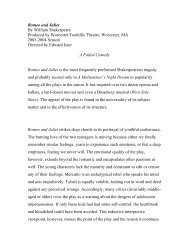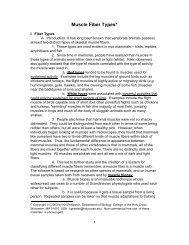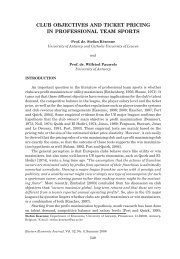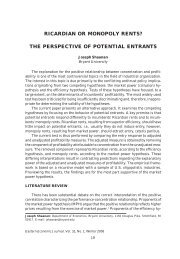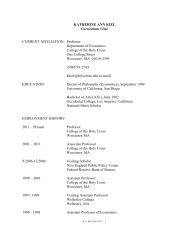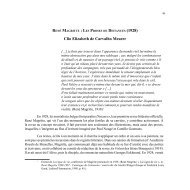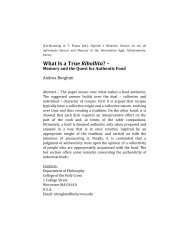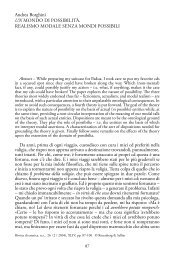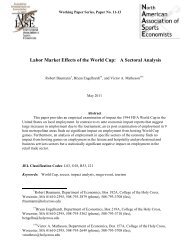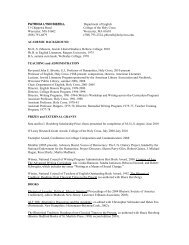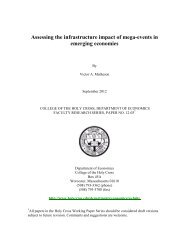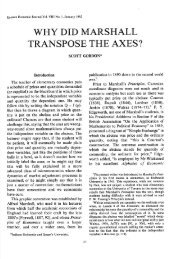29-2 Singh.pmd - College of the Holy Cross
29-2 Singh.pmd - College of the Holy Cross
29-2 Singh.pmd - College of the Holy Cross
Create successful ePaper yourself
Turn your PDF publications into a flip-book with our unique Google optimized e-Paper software.
CAPITAL ACCOUNT LIBERALIZATION<br />
195<br />
selective economic openness may be a superior strategy than ei<strong>the</strong>r free trade or<br />
autarchy. They also suggest that at a <strong>the</strong>oretical level, learning over time is a more<br />
relevant paradigm for developmental gains from trade than <strong>the</strong> neoclassical story<br />
that emphasizes <strong>the</strong> exploitation <strong>of</strong> arbitrage opportunities. 6<br />
To sum up, while <strong>the</strong> classical and neoclassical arguments for free trade suffer<br />
from serious conceptual and operational difficulties, selective trade or economic openness<br />
have substantive benefits that are more robust than <strong>the</strong> traditional neoclassical<br />
<strong>the</strong>ory suggests. Such benefits can be realized, however, only in a world conjuncture<br />
in which full employment and o<strong>the</strong>r structural conditions outlined above are met,<br />
coupled with an appropriate set <strong>of</strong> domestic policies that go considerably beyond <strong>the</strong><br />
limits <strong>of</strong> commercial policy as traditionally defined.<br />
The Case for Capital Account Liberalization<br />
The case for capital account liberalization was authoritatively put forward by<br />
Stanley Fischer, <strong>the</strong> former Deputy Managing Director <strong>of</strong> <strong>the</strong> International Monetary<br />
Fund, in <strong>the</strong> following terms:<br />
that <strong>the</strong> benefits <strong>of</strong> liberalizing <strong>the</strong> capital account outweigh <strong>the</strong> potential costs;<br />
that countries need to prepare well for capital account liberalization: economic<br />
policies and institutions, particularly <strong>the</strong> financial system, need to be adapted to<br />
operate in a world <strong>of</strong> liberalized capital markets; and<br />
that an amendment <strong>of</strong> <strong>the</strong> IMF’s Articles <strong>of</strong> Agreement is <strong>the</strong> best way <strong>of</strong> ensuring<br />
that capital account liberalization is carried out in an orderly, non-disruptive<br />
way, that minimizes <strong>the</strong> risks that premature liberalization could pose for an<br />
economy and its policymakers. [1997]<br />
Fischer suggests that, at a <strong>the</strong>oretical level, capital account liberalization would<br />
lead to global economic efficiency, allocation <strong>of</strong> world savings to those who are able to<br />
use <strong>the</strong>m most productively, and would <strong>the</strong>reby increase social welfare. Citizens <strong>of</strong><br />
countries with free capital movements would be able to diversify <strong>the</strong>ir portfolios and<br />
<strong>the</strong>reby increase <strong>the</strong>ir risk-adjusted rates <strong>of</strong> return. It would enable corporations in<br />
<strong>the</strong>se countries to raise capital in international markets at a lower cost. It is suggested,<br />
moreover, that such liberalization leads to fur<strong>the</strong>r development <strong>of</strong> a country’s<br />
financial system, which in turn is thought to enhance productivity in <strong>the</strong> real economy<br />
by facilitating transactions and by better allocating resources. Some argue that free<br />
capital movements will help increase world welfare through ano<strong>the</strong>r channel, namely<br />
transferring resources from aging populations and lower rates <strong>of</strong> return in advanced<br />
countries to younger populations and higher rates <strong>of</strong> return in newly industrializing<br />
economies. Such resource transfers will be Pareto optimal as both rich and poor countries<br />
would gain.<br />
Summers succinctly sums up <strong>the</strong> core point <strong>of</strong> <strong>the</strong> orthodox perspective as follows:<br />
“… <strong>the</strong> abstract argument for a competitive financial system parallels <strong>the</strong> argument<br />
for competitive markets in general … Just as trade in goods across jurisdictions<br />
has benefits, so too will intertemporal trade and trade that shares risks across<br />
jurisdictions have benefits” [2000, 2].



